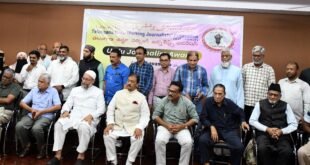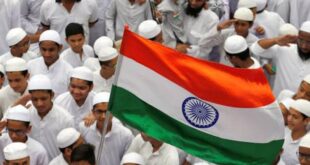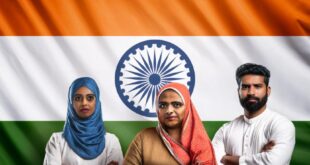By: Asad Mirza
The election results for the BJP weren’t just a wave, but more like a tsunami or a devastating earthquake that demolished all that stood in its way. The mandate people gave Narendra Modi has dramatically altered the political map of India. It will keep analysts busy for months. Some will keep warning their compatriots about the rise of intolerant fascism, and the Gandhis and others will shout themselves hoarse about the looming threat of a Hindu Rashtra destroying the Nehruvian ‘Idea of India’. Most of the space in print and electronic media has been hogged by the decimation of the Congress and yet another humiliating performance by RaGa. It has distracted our attention from other perhaps even more significant tectonic shifts that have taken place.
It’s highly unlikely that Congress will ever rise like the Phoenix in near or distant future, but the results have definitely sounded the death knell for the Communist parties. Both CPI and CPI(M) managed to scrounge just five seats in the Lok Sabha and four of these were practically gifted by the DMK in Tamil Nadu. The CPI(M) drew a blank even in West Bengal and Tripura, once considered its impenetrable citadels. The much-hyped election of Kanhaiya Kumar in Begusarai ended with a whimper with the articulate youngster losing by hundreds of thousands of votes.
Does anyone remember that in the first Lok Sabha the Communists were the largest party in Opposition? They have themselves to blame. The ideologues in CPI(M) and CPI lived in denial, committing one Himalayan blunder after another and jumped into the dustbin of history with their feet firmly in their mouth. No mean feat. RIP.
One may call Modi a megalomaniac, trigger-happy warmonger, a dangerous demagogue fanning communal passions, but it can’t be denied that he proved himself more credible to the voters. No purpose is served by tying oneself in knots about the fatal flaws in our first past the post electoral system or the unfair domination of media by the party in power. Modi mesmerised the voters even in states ruled by the Congress. Nor did the grand alliance forged against NDA in UP work. As a matter of fact, the myth of social engineering, arithmetic of caste-based coalitions has finally been punctured. Those holding/wielding the ‘Kamandal’ are having the last laugh. The forces of identity politics unleashed by the Mandal Commission are now exhausted.
On international arena, Prime Minister Narendra Modi is now in the same league as Presidents Donald Trump, Xi Jinping, Vladimir Putin, Chancellor Angela Merkel and Prime Minister Shinzo Abe of Japan. These leaders will, to a large extent, manage or mismanage the international order, international organisations, the world’s trembling economy, immigration problems and the rise of nationalism and the near abandoning of leftism minus China and Russia.
Prime Minister Modi and his team must have worked out the priorities of Modi II. He made certain unexpected and welcome pronouncements in his nearly two-hour-long speech at the Central Hall of Parliament. His government would look for the cooperation of the Opposition in the implementation of his national development policies. Secondly, encouraging words for the concerns and doubts of the minorities. The main minority are the Muslims, numbering over fifteen crore. They need genuine assurances. Hindutva should not mean anti-Islamism. For the moment it seems so. Throughout the campaign and in his post campaign speeches not a word was said about population control. Improving the living standards of the poor—the gharib—and not subscribing to birth control contradict each other rather spectacularly.
The Muslims on their part, seemed shell shocked by the election results and in the initial days there was not a single reaction from any of the so-called Muslims leaders. The Muslims masses seem rudderless and clueless, facing an onslaught of victorious expressions on the social media.
However, just less than a fortnight after the election results and a new government taking oath, a group of Muslim community leaders, mostly comprising of educationists and philanthropists wrote a letter to the prime minister, wishing him well and assuring him of the community’s support for his various initiatives.
But just writing a letter and expressing their willingness to cooperate with the new government is not going to change the ground situation. The Muslims all over the country are wary of their leaders, except a few exceptions like Asad Uddin Owaisi. The Muslims want their own leaders to med their way first. The manner in which the previous Modi government gave a tight slap to the religious and community leaders on the issue of Talaq, is a case for this.
The Muslims want their leaders to accept the challenges before the community, but instead of just promising the government to cooperate with it, they want the leaders to take the community along with them and deliver on different issues facing the community in a fair and transparent manner, instead of just politicising them for their political gains. First, we should have a consensus on different contentious religious issues facing the community and then secondly try to copy what and how other community leaders have done for the betterment of their communities.
In the current political situation we do not just need people who want to be seen in the political corridors, but who really have concern for the community and have delivered something for it in the past.
Asad Mirza is a Senior journalist based in New Delhi. In his career spanning more than 20 years, he was also associated with BBC Urdu Service and Khaleej Times of Dubai. He writes on Muslims, educational and international affairs issues.
 Gawah (The Witness) – Hyderabad India Fearless By Birth, Pristine by Choice – First National Urdu Weekly From South India – Latest News, Breaking News, Special Stories, Interviews, Islamic, World, India, National News
Gawah (The Witness) – Hyderabad India Fearless By Birth, Pristine by Choice – First National Urdu Weekly From South India – Latest News, Breaking News, Special Stories, Interviews, Islamic, World, India, National News





